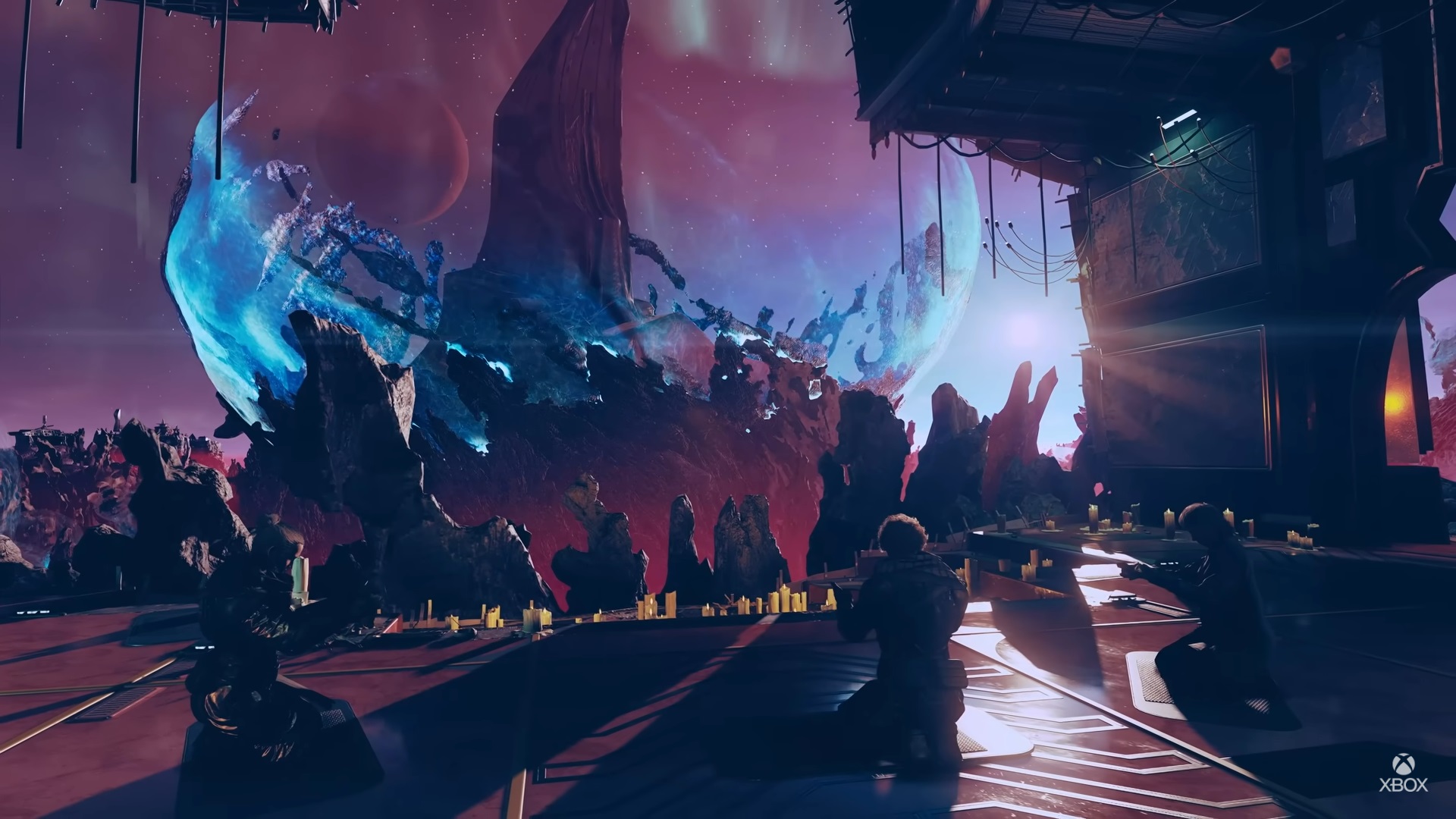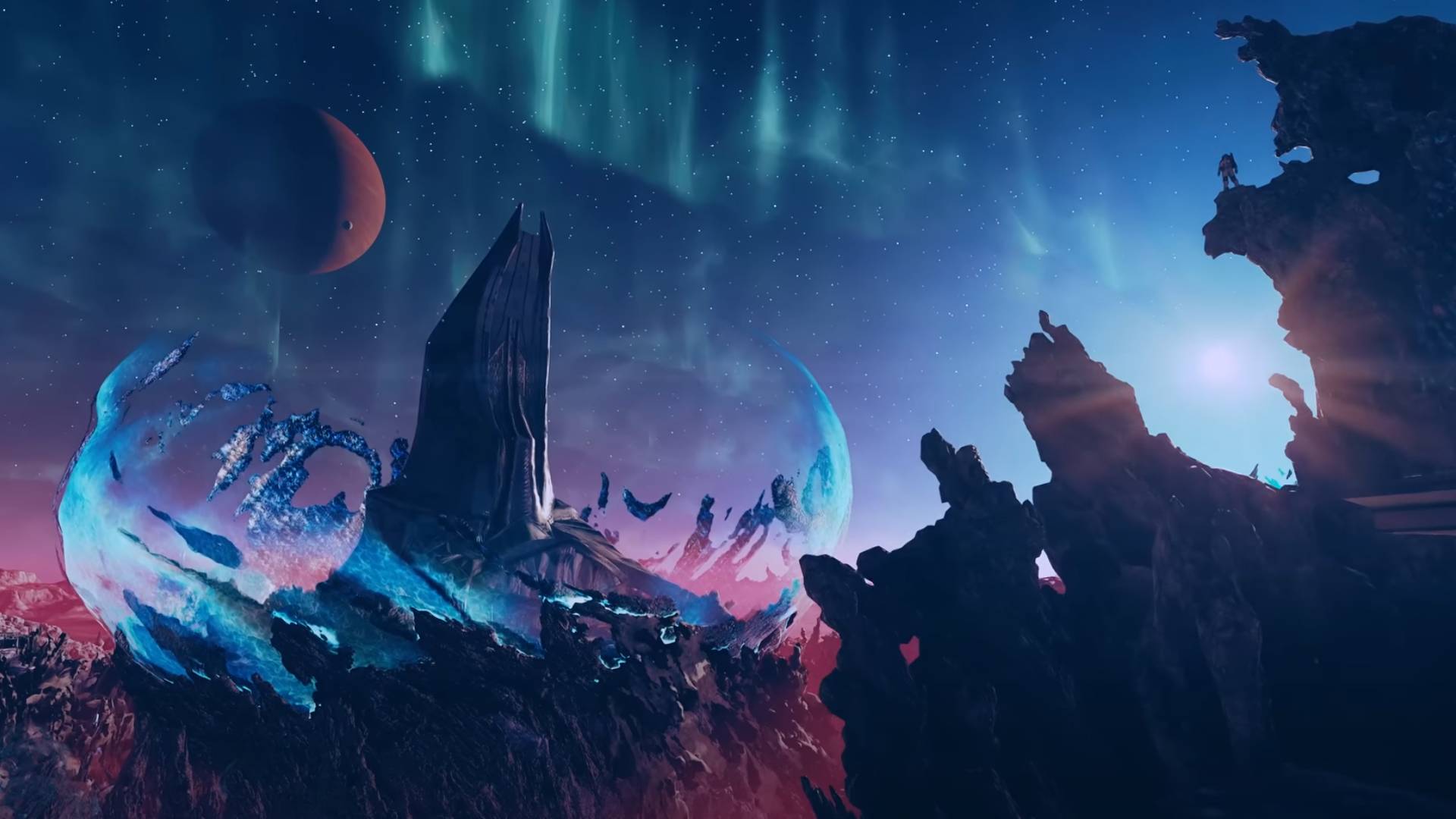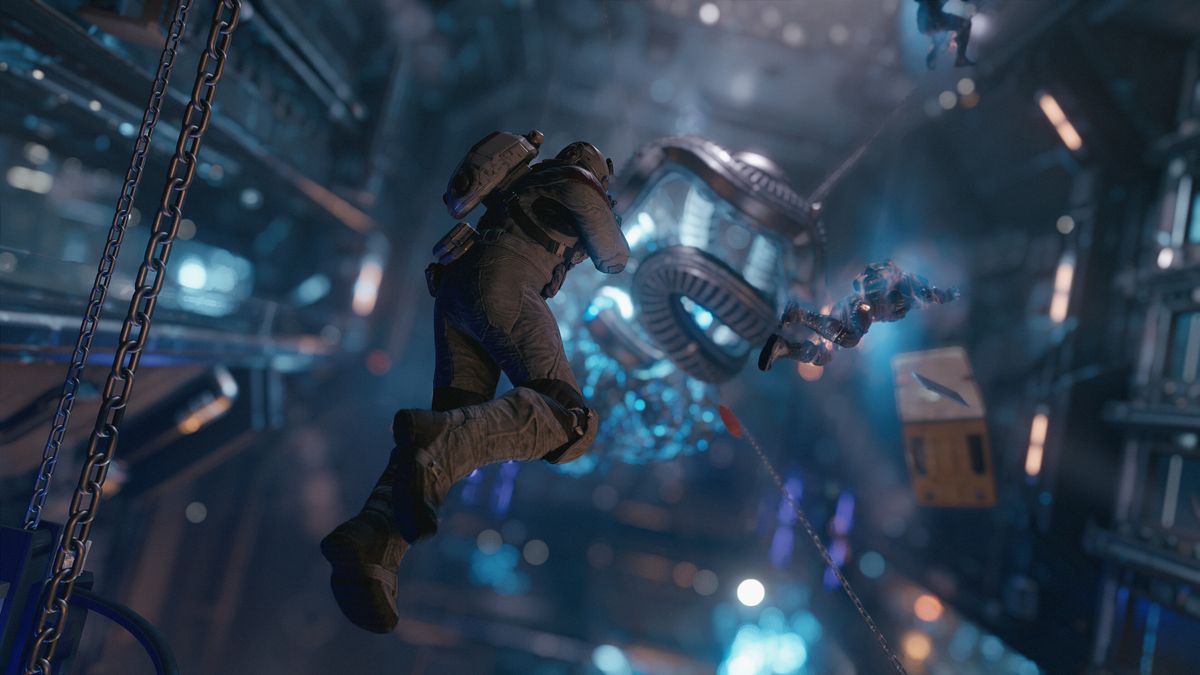If there’s any studio that knows how to make a memorable DLC, it’s Bethesda. From taking us to Mirelurk-infested shores in Fallout 4’s Far Harbor, to the realm of Madness in Oblivion’s Shivering Isles, or the vampire hunter fortress in Skyrim: Dawnguard, Bethesda has delivered a strong lineup of expansions over the years. Each one built on the sprawling worlds with new locations, and fleshed out their respective base game’s experiences with fresh faces and stories. Now, Starfield Shattered Space promises to follow suit by letting us delve into the story of the mysterious Va’ruun faction on the homeworld planet of Va’runn’kai. While Starfield is home to over 1,000 planets and makes use of procedural tech for its random instances, the new expansion’s world has been hand-crafted to recapture the exploration of Fallout and Skyrim.
“We knew very early on that we needed to add an explorable landmass with lots of hand-crafted content,” studio design director Emil Pagliarulo says, “as opposed to the base game’s method of providing systemic and procedural content on these massive planets. Knowing that content is contained to a single, large landmass means players can explore like they used to in Fallout and Skyrim.”
The goal, says Pagliarulo, is for players to feel like they’re stumbling upon surprises left by Starfield’s developers, whether that’s a “specific story,” random encounter, or unique item. If this sounds far from the procedural sprawl of Starfield, you’d be right for thinking so. “You know, we get it,” adds Pagliarulo. “The vibe is very different between random, procedurally generated content and bespoke goodness. And while there’s definitely some procedural, repeatable content in Shattered Space, this is a DLC dedicated to bespoke goodness.”
Alien homeworld
“Bespoke goodness” feels fitting when it comes to shaping an experience around the Va’ruun faction. As we’ve explored the cosmos as a member of Constellation, we had the chance to join the ranks of a number of Starfield factions, from the Freestar Collective rangers to the United Colonies, and even the morally ambiguous Crimson Fleet. Va’ruun, on the other hand, are noticeably absent in the core experience, but Starfield has laid the groundwork to make Va’ruun one of the more intriguing, mysterious, and just plain weird groups in the Settled Systems. Since we’ve yet to really get up close to Va’ruun and discover what the deal is with their Great Serpent worshipping ways, they make for prime expansion material – not only in the gaps it could fill story wise, but thanks to the peculiar nature of the group.
Once Bethesda decided to put the spotlight on the faction in the DLC at the end of Starfield’s development, the team set out to make a bespoke homeworld and city that feels distinctly unique to Va’ruun. “When House Va’ruun was first created as a faction, in our discussions and documentation, we went fairly deep into their background. Or rather, we went wide,” Pagliarulo says. “We knew a lot about them, but didn’t really deep dive into the specifics. But those high-level details told us a lot. We knew House Va’ruun was the most “alien” of all the human factions in the Settled Systems. We knew they were isolationists, weird sort of Lovecraftian cultists, in a sense. And we knew their homeworld was Va’ruun’kai.”
Pagliarulo adds that Bethesda “talked a lot” about what Va’ruun’kai was like during Starfield’s early days of development: “One of the reasons we never really fleshed their homeworld out on paper was because we really hoped that someday, somehow, we’d be able to bring House Va’ruun to life as a playable faction. And we’d be able to give players Va’ruun’kai. And however else you want to describe it, Va’ruun’kai would be… weird. But how weird? And weird in what way? What could we pull off?”
These questions drove the team’s approach when it came to making the homeworld “truly unique” in the Settled Systems. Once they decided to actually build the world for the expansion, they started testing the limitations of what they could do. Could they, for example, make “some kind of eternal eclipse” or “pools of mercury” in the creation tools?
As Pagliarulo explains, with so many explorable planets and moons in Starfield, there’s probably one out there somewhere that’s similar to Va’ruun’kai. But as a “harsh place” that’s “kind of Klingon in that regard” – both the Klingon homeworld and Rura Penthe from Star Trek came up as references – the team tried to push the design of the planet even more by asking, “‘How can we make this place beautiful in its own specific Va’ruun way?'”.
“In the end, we really love the aesthetic of the homeworld, and the city of Dazra in particular, Pagliarulo adds. “I think it’s really unique fictionally and aesthetically, especially when you compare it to the other cities in the game. It tells the story of a human faction that is at the edge of ‘normal’ civilization. Pushing the boundaries of the game’s NASAPunk aesthetic, certainly, but also, on a lot of levels, pushing the boundaries of what is and is not culturally acceptable. In fact, Morrowind and its themes and overall vibe were a big inspiration.”
Cosmic horror

“The concept of celestial horror is sort of in the House Va’ruun DNA”
Emil Pagliarulo
As we explore the unique aesthetic of the city for ourselves, the expansion also arguably aims to deliver “bespoke goodness” through its shift in tone. With Va’ruun at the center of the story in Shattered Space, the expansion leansinto horror by tapping into the unsettling nature of the faction. With more aggressive enemies that will no doubt put our higher level talents to good use, a strange experiment gone awry will bring us to the planet, where things will no doubt get weird.
“The concept of celestial horror is sort of in the House Va’ruun DNA,” says Pagliarulo. The faction is defined by their worship of an invisible celestial entity that will one day ‘envelop’ the world. They’re 2/3 Cthulhu cult by design. So there really isn’t a House Va’ruun DLC without those kinds of elements.”
Of course, Starfield is no stranger to veering into the realms of weirdness. If you’ve finished the space-faring RPG, for example, you’ll know it has a rather novel way of bringing in New Game Plus – it makes you question what’s actually possible in the cosmos and what reality it is that you want to be in. And in Shattered Space, as Pagliarulo teases, questioning reality is something we’ll likely have to contend with when we step onto Va’ruun’kai.

“By the end of the main quest, the player realizes there’s some crazy space angel stuff going on, and the game isn’t as ‘astronaut-grounded’ as it seemed,” Pagliarulo says. “Controlling gravity isn’t exactly in the SpaceX employee handbook. Starfield is a weird, heady game in some ways, written by a lot of cool people, with a lot of great ideas. Along the main quest, we ask some questions, maybe, about the universe, and the line between science and theology.”
In a sense, you’ve probably played flavors of the expansion before, whether it be in the seclusion of Far Harbor, or in the Shivering Isles’ otherworldly strangeness. But with its Lovecraftian leanings among distant stars, there’s nothing in Bethesda’s wheelhouse quite like Shattered Space.
“Once you open up the possibilities of the universe truly being a place of wonders,” Pagliarulo adds, “you start to question what’s possible and what isn’t. What’s real and what isn’t. And that’s where cosmic horror lies in wait.”
A fan of exploring among the stars? Check out our pick of the best space games.

